News
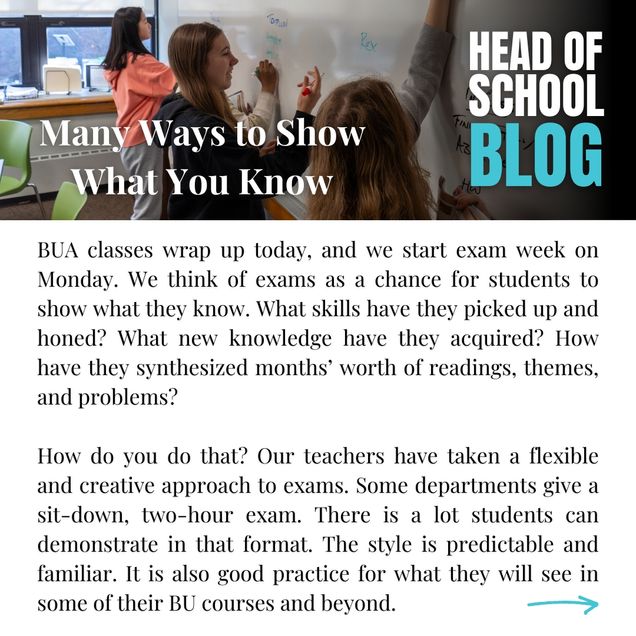
Many Ways to Show What You Know
BUA classes wrap up today, and we start exam week on Monday. We think of exams as a chance for students to show what they know. What skills have they picked up and honed? What new knowledge have they acquired? How have they synthesized months’ worth of readings, themes, and problems?
How do you do that? Our teachers have taken a flexible and creative approach to exams. Some departments give a sit-down, two-hour exam. There is a lot students can demonstrate in that format. The style is predictable and familiar. It is also good practice for what they will see in some of their BU courses and beyond. Some courses have moved to in-person, one-on-one interview formats – most commonly in history classes, but recently in geometry as well. In dialogue with students, teachers probe a range of topics spanning the semester’s content and requiring students to flex their critical thinking muscles. Others assign papers, knowing that there is no better way to hone your writing than by practice. Still others have offered up avenues for projects – showcases for content mastery, creativity, and sometimes collaboration. The end result is a week that gives students multiple ways to show what they know, some playing more to a given student’s strengths than others. The variation from day to day adds some color to the week and creates chances for more flexibility in terms of time; some students find time to get lunch with their friends (and even do some holiday shopping) between exam days. And while exam week may never be everybody’s favorite, some students say that they kind of like it.
Wishing all of our students good luck next week!
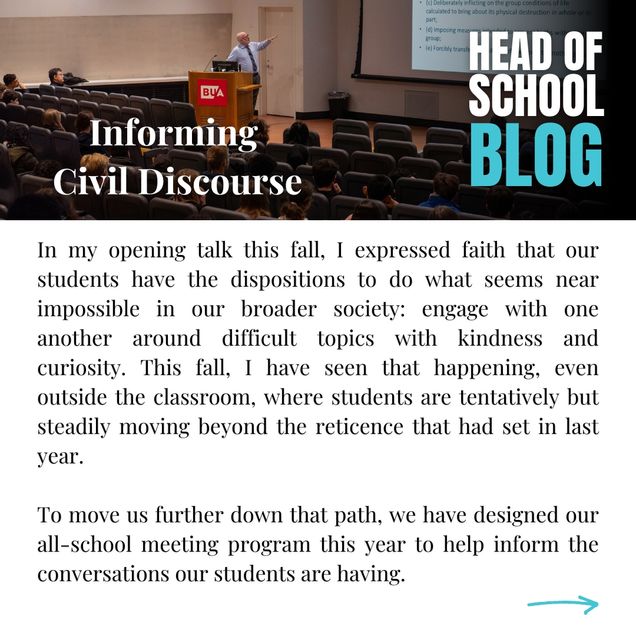
Informing Civil Discourse
In my opening talk this fall, I expressed faith that our students have the dispositions to do what seems near impossible in our broader society: engage with one another around difficult topics with kindness and curiosity. This fall, I have seen that happening, even outside the classroom, where students are tentatively but steadily moving beyond the reticence that had set in last year.
To move us further down that path, we have designed our all-school meeting program this year to help inform the conversations our students are having. Shortly before the election, BU history professor Dr. Bruce Schulman talked about several key presidential elections in the 20th century with the goal of helping us all understand how we have landed with this particular flavor of two-party election in 2024. We then welcomed Dr. Nancy Harrowitz, the Director of BU’s Elie Wiesel Center for Jewish Students, and Dr. Mohammad Zaman, the Director of BU’s Center on Forced Displacement. They shared their experiences leading university-wide working groups last year on anti-Semitism and Islamophobia respectively, as well as their opinions on campus climates nationally in the wake of October 7. Just this week, BU professor Dr. Tim Longman, one of the world’s leading authorities on the Rwandan genocide and its aftermath, unpacked that tragic period of history. He also walked our students through the origins of the term “genocide,” the definition in the UN Convention, and how it might or might not apply to recent events in Ukraine and Gaza. Later this winter, Dr. Veronika Wirtz from BU’s School of Public Health will join us to talk about her research about misinformation on TikTok, specifically related to the marketing of Ozempic, but with applicability to many areas. And there are some other pieces in the works. This is all a supplement to the deep work our students do with their teachers in class, particularly in history, where several of our offerings are meant to create a factual context for understanding today’s world.
We owe it to our students to give them what they are unlikely to get from social media and echo-chamber news sources: thoughtful, reliable context to empower them to form their own opinions and test them against others’.

Research Highlight: Metch Nelson ’25 Investigates Disparities in Healthcare via Large-Scale Genetic Research Studies
 For his senior thesis project, Metch Nelson '25, in collaboration with Dr. Brett Maricque at Washington University in St. Louis, is researching the disparities in healthcare in the context of large-scale genetic research programs. Specifically, Metch's research focuses on the National Institute of Health's All of Us Program, which aims to improve health care by building a diverse database that can inform thousands of studies on a variety of health conditions. Below, Metch shares more about his thesis research and why he was inspired to take on this work.
For his senior thesis project, Metch Nelson '25, in collaboration with Dr. Brett Maricque at Washington University in St. Louis, is researching the disparities in healthcare in the context of large-scale genetic research programs. Specifically, Metch's research focuses on the National Institute of Health's All of Us Program, which aims to improve health care by building a diverse database that can inform thousands of studies on a variety of health conditions. Below, Metch shares more about his thesis research and why he was inspired to take on this work.
Tell us about your research.
My research focuses on the All of Us Research Program, a large-scale genetic initiative designed to accelerate precision medicine by collecting diverse health data from one million or more participants across the US. The program's goal is to improve healthcare outcomes by ensuring personalized treatment approaches. I am specifically examining the program's history, motivations, leadership, participant engagement, and challenges, with an emphasis on understanding and addressing the lack of diversity in genomic datasets.
How did you become interested in this topic?
My passion for equitable healthcare access arose because of my family's Haitian background. The realization that underrepresented communities are often excluded from genetic research resonated with me.
What is the All of Us program?
The All of Us Research Program is an initiative by the National Institutes of Health (NIH) to create one of the most diverse health databases in the world. By gathering genetic, environmental, and lifestyle data from a wide range of participants, the program aims to enable researchers to develop more precise and effective ways to prevent and treat diseases.
How do underrepresented communities get left out of these large-scale genetic studies?
Typically, these people get left out of programs for two main reasons: historical distrust and lack of outreach. Because of their history with science through movements like eugenics, they're typically not interested in participating in these programs. Outreach is also a huge issue since oftentimes these programs don't reach out to more diverse neighborhoods because of the potential for these people to not be able to participate well enough because of their lack of resources.
What are some of the implications for underrepresented communities in terms of health outcomes and access to health care?
The main implications are worsened health outcomes and lack of access. Medical treatments are often less effective because research often overlooks these populations’ unique needs since there's a lack of participation in these genomic projects. Oftentimes, medical treatments are unaffordable for these underrepresented people.
What are some strategies that could be implemented to address these disparities?
The main strategies that could be implemented are structural changes within these large genomic projects. Community engagement is really important; if researchers engage in these communities – this could be holding workshops or information sessions – then trust can be built between these underrepresented people and the researchers. Incentivizing participation through some sort of financial compensation or support could increase their participation. Lastly, establishing a really strong ethical policy for these types of studies could ease underrepresented people's distrust in the research.

Lunch with Students
As I do every year, I’ve been hosting lunches this fall in my office with groups of seniors. I’ll do the same with juniors in the winter and then with all 9th and 10th grade advisory groups in the spring. On any given day, you can smell the Raising Cane’s chicken tenders, Chipotle burritos, and Otto pizza down the hall.
There is no agenda for the meetings. I’ll often ask how things are going to get a pulse check. The most fun part is when students start asking me questions – about how we do admissions, how the budget works, our relationship with BU, how we choose ASM speakers, how the curriculum changes, how financial aid works, where the school is going. The time flies by. Their curiosity comes through, but there’s more than that. They really care about their school. They feel a sense of pride and ownership. And they have good ideas. I’m looking forward to the next one!
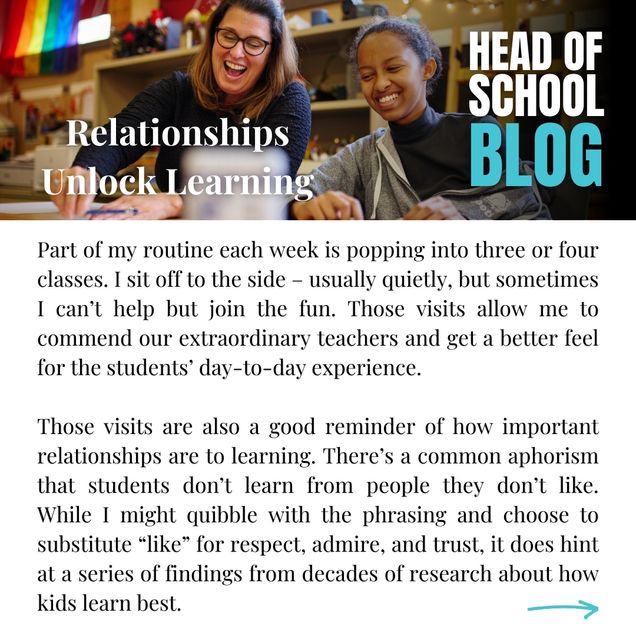
Relationships Unlock Learning
Part of my routine each week is popping into three or four classes. I sit off to the side – usually quietly, but sometimes I can’t help but join the fun. Those visits allow me to commend our extraordinary teachers and get a better feel for the students’ day-to-day experience.
Those visits are also a good reminder of how important relationships are to learning. There’s a common aphorism that students don’t learn from people they don’t like. While I might quibble with the phrasing and choose to substitute “like” for respect, admire, and trust, it does hint at a series of findings from decades of research about how kids learn best. Feeling seen, known, and loved by your teacher opens the door to learning. It creates a sense of emotional comfort and belonging. It allows students to make mistakes, admit what they don’t know, and ask for help without shame or fear of being discovered. In those classrooms, teachers can set high expectations and students want to meet them. Teachers can share their passion for a subject, and students get swept up in that passion. David Brooks wrote about these ideas in his 2019 New York Times opinion piece titled “Students Learn from People They Love.”
Just this fall, I saw so many ways teachers create that environment at BUA. I heard a classics teacher share a story of feeling particularly challenged in graduate school and the associated worry about underperforming – a moment of vulnerability that invited students to do the same. I observed an art teacher walking around from student to student offering one-on-one coaching – saying just enough to help the students take the next step and giving them the tools and confidence to do it themselves. I heard a science teacher share a fun childhood story to illustrate a tricky molecular concept. A music teacher in chorus riffing on the way that Spanish composers broke rules and the associated music-theory niceties. A math teacher offering, “You guys came up with a neat approach I hadn’t thought of.” A classics teacher making a Star Wars joke about Tataouine and its multiple suns to shed light on (sorry) the singular vs. plural ending to a noun.
I could go on. As Thanksgiving approaches, please join me in thanking our teachers for being the people our students deserve.
BU President Dr. Melissa Gilliam Shares Her Story at ASM
On the morning of Tuesday, November 12, BU President Dr. Melissa Gilliam addressed the BUA community at our weekly all-school meeting. In her remarks, President Gilliam shared details of her early life: the daughter of a groundbreaking abstract painter and the first Black woman reporter at the Washington Post, Gilliam attended independent schools in Washington, DC, and spoke fondly of a high-school English teacher who, in a comment on one of her papers, encouraged Gilliam to be a "Renaissance person." Gilliam took her teacher's advice to heart: her indirect career path to university leadership reflects an abiding curiosity and a refusal to be pigeonholed into just one field of study -- much like BUA students.
Before her installation as BU's 11th president, and also its first female and first Black president, in September of 2024, President Gilliam served as provost and executive vice president at The Ohio State University, and, previously, as vice provost of the University of Chicago. She is also a professor of obstetrics and gynecology and of pediatrics, with a focus on adolescent medicine and wellbeing. Gilliam studied English literature at Yale and received her Master of Arts in philosophy and politics from Oxford.
During the Q&A portion of our all-school meeting, President Gilliam graciously answered student questions on taking a circuitous career path despite the pressures of early specialization; the role of student voice in her BU administration; and how she carves out space for herself as a Black woman in predominantly white spaces.
This week's ASM talk is our second visit from President Gilliam this fall. In September, she took a student-led tour of BUA and met with students to hear about their high school experiences. At an internal BU meeting this fall, President Gilliam referred to BUA as a "Jewel of Boston University." We are grateful to President Gilliam for taking the time to listen and learn about our school, and for her recognition of BUA as an exceptional place with much to offer the broader BU community.
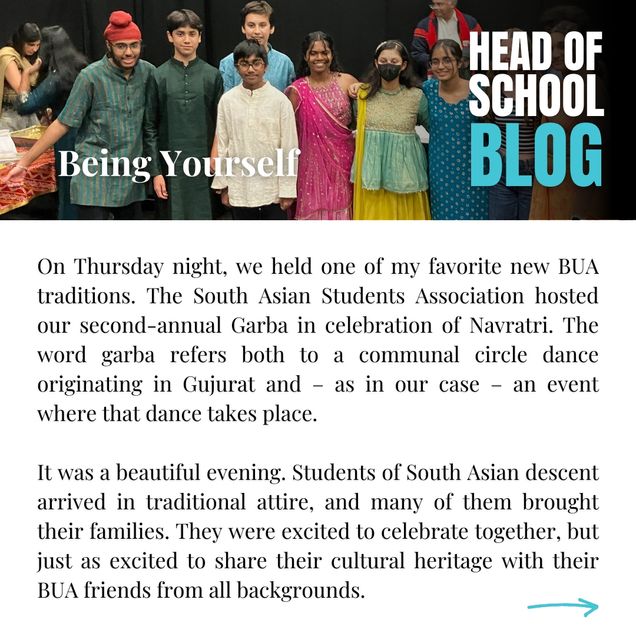
Being Yourself
On Thursday night, we held one of my favorite new BUA traditions. The South Asian Students Association hosted our second-annual Garba in celebration of Navratri. The word garba refers both to a communal circle dance originating in Gujurat and – as in our case – an event where that dance takes place.
It was a beautiful evening. Students of South Asian descent arrived in traditional attire, and many of them brought their families. They were excited to celebrate together, but just as excited to share their cultural heritage with their BUA friends from all backgrounds. They taught their peers several variations of the dances. In no time at all, several dozen students, parents, and teachers were up on their feet dancing, smiling, and learning from each other. I was struck and grateful to be part of a community where the South Asian students feel so comfortable bringing this important part of their lives to school. I was equally grateful to see so many students and adults with no previous experience in this style of dance get up and give it a try. They all seemed free to be themselves. The garba captured so much of what is special about this community. Looking forward to next year!
BUA Sophomore Earns Silver Medal at World Tap Championships
 BUA sophomore Lyahnnette Morales '27 and her USA teammates brought home the silver medal at the IDO World Tap Championships held in Prague, Czech Republic earlier this month. Despite being just 15 years old, Lyahnnette competed in the Adult Tap Formation category, which is usually reserved for those ages 17-31. She shares the below reflections on the experience and on her dance career:
BUA sophomore Lyahnnette Morales '27 and her USA teammates brought home the silver medal at the IDO World Tap Championships held in Prague, Czech Republic earlier this month. Despite being just 15 years old, Lyahnnette competed in the Adult Tap Formation category, which is usually reserved for those ages 17-31. She shares the below reflections on the experience and on her dance career:
Congratulations on your accomplishments at the IDO World Tap Championships! Tell us about that experience.
The World Tap Championships was a great experience for me. This is my second time competing at IDO's Tap Championship -- I went when I was 10 years old and came home with 5th place. This year World's was held in Prague, Czech Republic at the University of New York in Prague's (UNYP) arena.
There were five days of competition in different age categories, starting Wednesday morning and ending Sunday night. After spending some time sightseeing, I came to the arena every day to support USA's team. I competed on Friday with my dance "The Waiting Room" in the Adult Formation's first round. Adult Formation is a category of dancers aged 17-31 (I was moved up although I am only 15), who are judged heavily on intricate transitions and formations while tap dancing. This takes a lot of precision and focus on where you are exactly at all times. In the first round, the judges score the formations heavily on their cleanliness and precision throughout the transitions of the dance.
After performing our dance we waited for the results, which determined whether we made it into the semi-final round. As we waited, other categories performed their dances and we watched the Parade of Nations, an event in which teams from each country shows off their gear and accessories. Once all countries have shown off their national spirit, the judges are re-introduced and catwalk down the red carpet. It's a very entertaining and loud event as every nation competes to be the loudest and show the most spirit.
After this, the results were announced. "The Waiting Room" moved on to the semi-finals, allowing us to perform the dance again the next day, now competing to be one of the top six teams moved into the finals round. In the semi-final round, judges focus the scoring more on tapping and facial expressions.
The next morning, we got on shuttles to the UNYP arena. We did a dry rehearsal, meaning no tap shoes or costumes, just running through and cleaning up the piece. We ran through the dance countless times, making sure not only our tapping was perfect, but our traffic patterns, formations and arm movements are as well. Between our morning rehearsal and semi-final performance, I watched some of the other dances and traded pin and other trinkets with the other nations. Trading is a big part of the IDO World Tap Championships. You can trade anything from pins to caps to backpacks -- the only rule is they have to be on theme with your nation (USA flag pins, America hats, etc.). By the end of the week, I ended up with trinkets from Australia, United Kingdom, Canada, Switzerland, Germany, Mexico, and Czechia.
That evening, we performed in the semi-final round. Our group collectively agreed that even if we don't make it through to the finals, that this was our best run of the dance and we're proud of the job we did. But the judges must have also thought it went well because we moved on to finals! We all hugged and put our USA team tracksuits on over our costumes. Standing off to the side of the stage with American flags wrapped around us, we wait as the suspenseful trumpet fanfare plays. After the announcer reveals 6th-4th place, we excitedly huddle together, not believing we made it to the podium. When the announcer reveals who gets the bronze medal, the majority of the team is already in tears. After a pause, the announcer calls "The Waiting Room" from team USA. By this time we're all in hysterics as we squeeze to take our place on the podium, get our second place trophy, and receive silver medals shaped like the metal on a tap shoe. After a hard week of dancing we get to go back to the hotel and celebrate our win for USA. Competing at the IDO World Tap Championships will forever hold a special place in my heart as an experience where I got to make new friends from all over and push my limits.
How long have you been dancing?
I've been dancing for thirteen years. I started at the age of two.
What’s your favorite style of dance, and why?
I enjoy many styles of dance, but if I had to choose one I would say Jazz is my favorite. I grew up being one of those little girls who is very sassy, so Jazz gives me an outlet to portray that side of my personality without coming off as bratty or spoiled. Not only that, but Jazz has so many minor styles inside of it and each one is its own art. I personally love all types of Jazz since I can portray different characters inside of it, but some of the micro styles include Musical Theatre Jazz, Classic Jazz, Heels Jazz and Jazz Funk.
What role does dance play in your life?
Dance has always had a very prominent role in my life. I believe it teaches discipline, motivation, and good work ethic. Dancing isn't just an art, I see it as a sport. It's the type of activity where you train year-round like athletes and then have to compete onstage and make everything look effortless and artistic. Dance gives me a way to express myself without having to use words, just movement, and to really explore my own body's limitations and capabilities.
What’s the most exciting place or experience your dance career has brought you?
The most exciting place dance has brought me to would be to the Rolex Grand Prix in London, England in 2019.
How do you balance your schoolwork with a demanding dance schedule?
I dance five days a week after school so balancing my schoolwork with other schedules is a difficult task. I find doing schoolwork on the way to dance very helpful. By the time I get home it's usually 10:00 p.m. and I feel too exhausted or drained to do homework as effectively. I also believe fueling my body and napping is good between school and dance. I try my best to rest because fatigue can lead to possible injuries in dance or subpar work in school. Taking 5-10 minute non-electronic breaks between each task or homework assignment works the best for me to efficiently get schoolwork done. Although my sleep schedule isn't always consistently the greatest, around 11:30 p.m.-12:00 a.m. if I'm still doing homework I decide it's time to go to sleep and I can finish the rest of my tasks in the morning.
What advice would you share with other current or prospective BUAers who hope to pursue an outside commitment at a high level?
Some advice I would share would be to always do things with the spirit of excellence. Meaning never be mediocre in a task because it's something you committed to and if you do it to the best of your ability it could open doors to opportunities you never knew could be possible. Continuing to work hard is always the best method you can have ,and I stand by this because "Hard work beats talent when talent doesn't work hard." - Tim Notke.
Cross Country Recap 10/22
Lucy '25 shares a recap of the BUA Cross Country team's race on October 22:
The cross country team ran another amazing race this week on the familiar territory of Gann Academy. The team pushed through unexpected heat and extended hills and ended strong! It was a great race for spectators with three loops around Gann’s soccer field, a short stint in the woods and winding around the back of the school. The race ended in a final sprint around the edge of the baseball diamond, perfect for fans to watch. Special shoutout to Sara '28 for crushing her first ever race! Another shoutout to our seniors, running their final (ever!) regular season race. And finally, congratulations to all the team members who joined this year, pushed themselves in practice, and have been running incredible races. Their hard work is obvious to anyone who watches and it’s incredible to see how much the team has grown. We’ll carry our momentum into next week, when we run our championship race at the Cambridge School of Weston! Go Terriers!
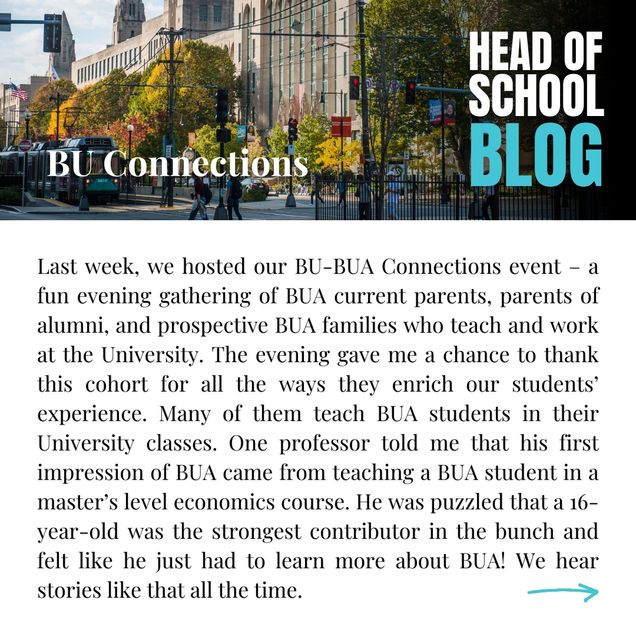
BU Connections
Earlier this week, we hosted our BU-BUA Connections event – a fun evening gathering of BUA current parents, parents of alumni, and prospective BUA families who teach and work at the University. The evening gave me a chance to thank this cohort for all the ways they enrich our students’ experience. Many of them teach BUA students in their University classes. One professor told me that his first impression of BUA came from teaching a BUA student in a master’s level economics course. He was puzzled that a 16-year-old was the strongest contributor in the bunch and felt like he just had to learn more about BUA! We hear stories like that all the time.
These families help out in so many other ways. They hire BUA students as researchers in their labs. They advise senior theses. They speak at our school meetings and suggest other great colleagues to do the same. They open the doors for our kids to engage with departments and interdisciplinary institutes up and down Commonwealth Avenue – like the Software & Application Innovation Lab and EPIC (BU’s 15,000 square-foot makerspace), both of which are now part of our 10th-grade seminar program. And they spread the word about BUA with colleagues across the University. We are a much stronger school for their partnership.